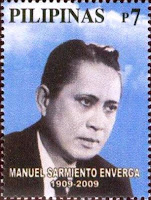Ninoy Aquino on Stamps

As a leading opposition figure during the Marcos administration, "Ninoy" spent many years in jail. He was allowed to go to the United States of America for health reasons. His assassination upon his return at the Manila International Airport roused the Filipinos from their apathy anad led the way to the People Power Revolution of 1986 which ousted Marcos. His murder remains unsolved to this day.
Benigno Simeon "Ninoy" Aquino, Jr. (November 27, 1932 – August 21, 1983) was a Philippine Senator, Governor of Tarlac, and an opposition leader against President Ferdinand Marcos. He was assassinated at the Manila International Airport (later renamed in his honor) upon returning home from exile in the United States. His death catapulted his widow, Corazon Aquino, to the limelight and subsequently to the presidency, replacing the 20-year Marcos regime.
In 2004, the anniversary of his death was proclaimed as a national holiday now known as Ninoy Aquino Day.
Although Aquino was recognized as the most prominent and most dynamic opposition leader of his generation, in the years prior to martial law he was regarded by many as being a representative of the entrenched familial elite which to this day dominates Philippine politics. While atypically telegenic and uncommonly articulate, he had his share of detractors and was not known to be immune to ambitions and excesses of the ruling political class. However, during his seven years and seven months imprisoned as a political prisoner of Marcos, Aquino read the book Born Again by convicted Watergate conspirator Charles Colson and it inspired him to a religious awakening.
As a result, the remainder of his personal and political life had a distinct spiritual sheen. He emerged as a contemporary counterpart of the great Jose Rizal, who was among the world's earliest proponents of the use of non-violence to combat a repressive regime.
Some remained skeptical of Aquino's redirected spiritual focus, but it ultimately had an effect on his wife's political career. While some may question the prominence given Aquino in Philippine history, it was his assassination that was pivotal to the downfall of the Marcoses and the eventual restoration of democracy in the Philippines.
The stamp was issued on February 14, 1988






